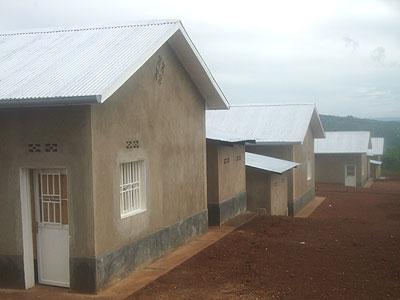AT least 125 houses have been constructed this year for ex-combatants by Rwanda Demobilisation and Reintegration Commission (RDRC).


AT least 125 houses have been constructed this year for ex-combatants by Rwanda Demobilisation and Reintegration Commission (RDRC).According to officials, the houses were built in the districts of Rwamagana Rwamagana, Gatsibo and Nyagatare in the Eastern Province. Last week on Thursday another official handover of other 38 houses to ex-combatants in category II took place in Muyombo Sector, Rwamagana District. RDRC categorised ex-combatants basing on their form or level of disability. Category one and two are those with a complex form of disability; and according to the law, they are meant to receive houses from the commission. 469 houses have been constructed ever since the construction programme for ex-combatants started. The houses which were constructed in Muyombo Sector have three bed rooms, a sitting room, a small store and a toilet and each unit cost over Rwf 12 million. Speaking on behalf of other beneficiaries, Callixte Kimana said that receiving a house from the commission was a relief from paying rent since he was no longer able to work and earn."Like any other person with a form of disability that cannot enable one to work, life becomes so hard especially when you are trying to survive on your own. An opportunity to get shelter becomes a relief in such a person’s life,” Kimana said shortly after receiving the house.Speaking during the handover ceremony, Jean Sayinzoga, the Chairman of RDRC, called on beneficiaries to embrace government programmes, saying that this will enable them to benefit just like any other Rwandans."Besides these houses, there are also other programmes that you (ex-combatants) can benefit from, provided you take part and show commitment,” Sayinzoga said. He also advised them that one of the easiest ways through which they can develop themselves is through forming cooperatives.






